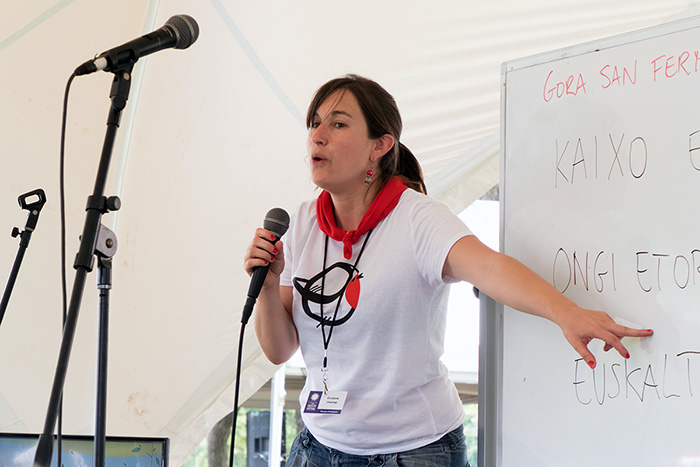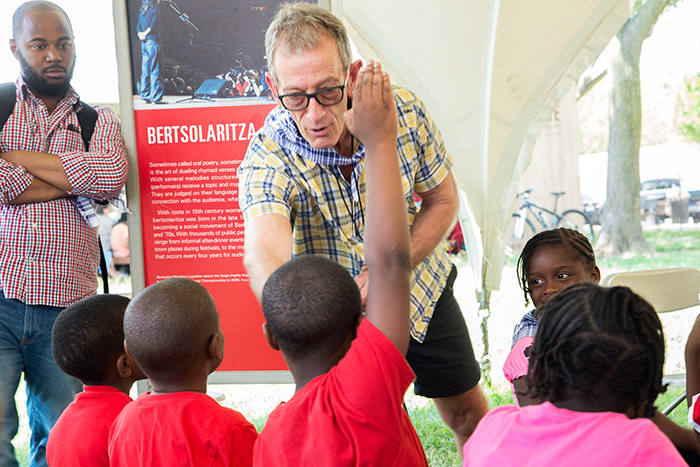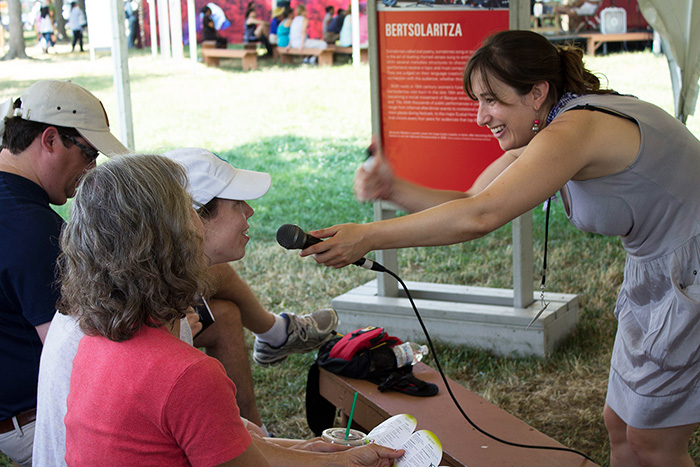A Basque Language Lesson

As visitors stream into the Euskaltegi Speaking Basque tent, quickly filling the long brown benches, Errukine Olaziregi hops onto the stage and unhooks the microphone from its stand. “Kaixo!” she calls out energetically, smiling and waving at the crowd. “Kaixo!” Across the stage, José “Kinku” Zinkunegi speaks into his microphone. “Who knows what this means?” he asks. A few brave audience members venture to guess the answer: “hello.”
These opening words began each of the Euskara language lessons at the Smithsonian Folklife Festival. The lessons started out with a few greetings.
Kaixo! (Hello)
Ongi etorri! (Welcome)
Egun on! (Good morning)
Arratsalde on! (Good afternoon)
Kinku and Errukine teach Euskara, the Basque language. As a language isolate, Euskara has no known linguistic relatives, and is thought to be the oldest living European language. It is connected to a rich history and culture, a source of pride for the people who speak it.
“It’s what makes us Basque people—the language,” Errukine says.
Along with Spanish, Euskara is the official language of the Basque autonomous community, which encompasses the provinces of Araba, Bizkaia, and Gipuzkoa in northern Spain. It also has official status in the northern regions of Navarre, and while used throughout the Basque provinces in southern France, it has no official standing there.

Compared to the 427 million Spanish speakers and 340 million English speakers in the world, the number of Euskara speakers is relatively small. With approximately 943,000 speakers worldwide, the Basque language is classified as threatened, but not endangered.
What makes a language endangered? A dwindling number of speakers who no longer pass the language onto their children, combined with the lack of use in daily activities and across different domains of life. In short, when language is no longer seen as related to people’s identity, it is at risk of endangerment.
Fortunately, this is not the case with Euskara. In Basque Country, the incorporation of Euskara in the educational system and the creation of euskaltegis, centers for learning the Basque language, have ensured that the language thrives and the number of speakers grows.
Errukine and Kinku work for Helduen Alfabetatze eta Berreuskalduntzerako Erakundea (HABE), the Institute for the Teaching of Basque and Basque Language Literacy to Adults. HABE is a Basque government institution that reinforces the use of Euskara in daily life. At the Festival, their language lessons were not only fun, but they served an important purpose. Literacy and language learning are the backbone of the Euskara recovery process and are crucial for the language’s continuation and transmission in the Basque country and abroad.

Errukine notes that programs such as the Folklife Festival are important for sharing knowledge of Euskara and the Basque culture worldwide. “It’s like opening a window to the world,” she says.
In the United States, Basque Americans are also finding ways to connect to their language and culture. Euskara language education is alive and well at Boiseko Ikastola, a total-immersion Basque preschool in Boise, Idaho. And members of numerous Basque organizations and clubs across the country gather for festivals and picnics to speak Euskara, play music, learn traditional dances, cook, and celebrate their Basque heritage together.
Back in the Euskaltegi tent, Kinku and Errukine move onto simple conversations, calling spontaneously upon visitors for responses. These conversations might seem simple, but they could come in handy for a trip to Basque country, a conversation with a Basque neighbor, or demonstrating your knowledge of a unique language.
As you read through the sample conversations, click on the audio clips to hear the dialogues and practice some Basque.
A. Kaixo, egun on! Hello, good morning!
B. Egun on. Nor zara? Good morning. What’s your name?
A. _______ naiz. My name is _______.
B. Kaixo, _______. Hello, _______.
A. Eta zu? And you?
B. ______ naiz. My name is ______.
A. Urte askotarako! Nice to meet you!
A. Kaixo, arratsalde on! Hello, good afternoon!
B. Arratsalde on. Good afternoon.
A. Zer nahi duzu? What do you want?
B. Kafe bat, mesedez. One coffee, please.
A. Esnea nahi duzu? Do you want some milk?
B. Ez, eskerrik asko. No, thank you.
A. Tori. Here.
B. Mila esker! Thanks a lot!
When Kinku and Errukine finished the lessons, smiling visitors rose from their seats, exclaiming over the beauty of the language. Strangers turned to one another to practice a “nor zara?” or an “urte askotarako.” Children gleefully shouted “kaixo!” and “agur!” (goodbye) to one another.
Three times a day, these language lessons brought Festival visitors together. Under the Euskaltegi’s white domed tent, language created a community.
Do you have your own heritage language that you are interested in learning more about?
Sarah Fredrick is a Basque program intern for the Smithsonian Folklife Festival. She is a recent graduate of the College of William & Mary, where she studied linguistics. Sarah enjoys learning new languages and is looking forward to showing off her coffee-ordering skills in Basque.

